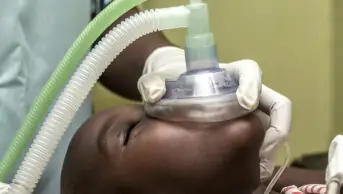
Shutterstock.com
Hospital pharmacists should work with clinical teams to conserve ‘limited supplies’ of the sedative propofol, owing to increased demand from COVID-19 patients, the government has said.
In a supply disruption alert, published on 3 February 2021, the Department of Health and Social Care said three presentations of the sedative — propofol 1% 100mL vials, propofol 1% 50mL vials and propofol 2% 50mL vials — would experience “intermittent supply issues … for several weeks”.
In that time, NHS trusts have been asked to “preserve propofol stocks for critical care sedation, induction of anaesthesia and target-controlled sedation as there are no reasonable alternatives”.
The alert advises clinicians to “avoid switching to benzodiazepines, such as midazolam” as they can lengthen patients’ stay in critical care and cause delirium.
Instead, “clinical teams working with pharmacy colleagues should prepare to switch between propofol presentations” and “work with in-house pharmacy aseptic units to establish the feasibility of making 50ml pre-filled syringes from smaller volume propofol presentations if required”.
The alert notes that there are no anticipated supply problems with propofol 1% 20mL ampoules and vials.
The Royal College of Anaesthetists (RCOA) had previously advised clinicians, during the first wave of the pandemic in April 2020, to use midazolam instead of propofol where supply pressures occurred.
However, William Harrop-Griffiths, vice president of the RCOA, told The Pharmaceutical Journal that the early guidance was based on “a distinct possibility there may not be enough, or any, propofol, because we weren’t exactly sure what the increase in number of intensive care patients was, and supplies were running very short indeed”.
“My understanding at the moment is, not that we are at risk of running out of propofol, but that stocks are starting to go down, so we need to conserve what propofol there is for intensive care use,” he said.
“Propofol is almost universally used to induce anaesthesia in adult patients and then most patients are kept asleep with an inhalational anaesthetic drug. However, there is an increasing popularity of total intravenous anaesthesia (TIVA), which depends on using quite large volumes of propofol to maintain anaesthesia,” he explained.
“What this alert has said — in order to preserve existing stocks for intensive care unit sedation — [clinicians] can carry on using propofol to induce anaesthesia, but you should only use propofol to maintain anaesthesia if you absolutely have to.”
According to the alert, which is valid until 1 May 2021, TIVA can be used for “patients in whom the use of inhalational agents might pose life-threatening risks (e.g. malignant hyperpyrexia), patients requiring intraoperative neurophysiological monitoring, or patients with a history of severe postoperative nausea and vomiting”.
The supply disruption follows a report for the NHS Benchmarking Network’s ‘Pharmacy and Medicines Optimisation’ project, which found that a third of acute hospitals experienced “complete outages” for some medicines during the COVID-19 pandemic, including the neuromuscular blocking agents atracurium and cistracurium, and propofol.


